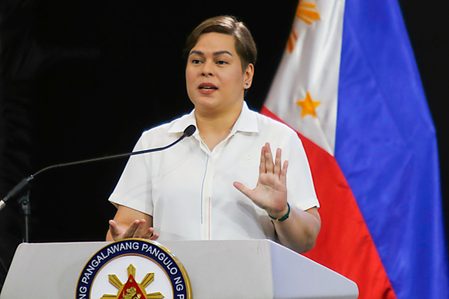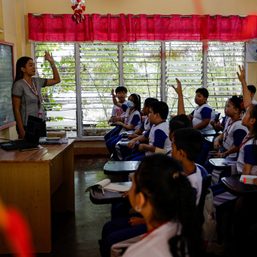SUMMARY
This is AI generated summarization, which may have errors. For context, always refer to the full article.
![[OPINION] The problem with the DepEd](https://www.rappler.com/tachyon/2023/05/IMHO-May-20-2023.jpg)
Heeding the Department of Education’s April 19, 2023 advisory inviting the general public and interested stakeholders to review and to submit their feedback on the Draft Shaping Papers of the Revised Curriculum Guides for Kindergarten to Grade 10, which is being prepared by the Bureau of Curriculum Development (BCD), I forthwith wrote a position paper titled “The War on Books” as a means to convey to the DepEd my viewpoint, suggestions, and recommendations.
The proposed Curriculum Guides will necessitate the writing, printing, and publication of a new batch of textbooks, learning modules, and other instructional materials, and I feel that it is a duty incumbent upon me to show the makers and creators of these new curriculum guides the lessons we ought to have learned from the many errors and mistakes of the past, in order to guide them and to persuade them to do it right this time.
It is disturbing to discover that in the new curriculum, five subjects, namely Civics, Arts, Culture, History, and Health are to be combined into one subject called SIKAP, which stands for Sibika, Sining, Kultura, Kasaysayan, and Kagalingang Pangkatawan.
The reason the DepEd wants to come out with the new curriculum is its belief that the old one is cluttered and confused and therefore in dire need of being “declustered” or “unclogged.” Yet, SIKAP, itself already a conglomeration of five subjects, is just one of six subjects in the new curriculum for Grade 1 to 3. From Grade 4 to 10, there are now a total of eleven subjects.
History, and specifically Philippine History, will be lumped together with such minor subjects as Civics, Arts, Culture, and Health and therefore stand in real danger of being diluted to the point of irrelevance and inconsequence. Philippine History will be taught only in Grade 5 and 6. The lessons on the Marcos dictatorship and Martial Law will be taught to sixth graders who are just 10 or 11 years old, and they will never encounter Philippine History ever again when they are in high school!
My position paper is my response to the DepEd’s invitation for the public to participate in the review process. I hope Rappler will help me bring its message to the Bureau of Curriculum Development which is now tasked with the very important and momentous responsibility to come up with a better alternative to the one currently being used in all Philippine schools.
The curriculum is being subjected to change every now and then, mostly driven by the personal whim and caprice of whoever sits as head of the DepEd. Our ruined and damaged system of education proves the utter folly and insanity of this constant and incessant change. Change is worthless and useless if it is not a change for the better.
The biggest mistake, the fatal error, of the proposed new curriculum is its failure to mandate the teaching of Philippine History in high school, when the students are more critical, discerning, and intuitive. Given that this is a fundamental error of the previous curriculum, isn’t it imperative that this should now be rectified and corrected?
Philippine History used to be taught as a distinct and dedicated subject in Grade 7. It was dropped and subsequently replaced by Asian History. The new curriculum now seeks to further reduce and limit the scope and coverage to just teaching the histories of the 11 countries there are in Southeast Asia. (The CG’s repeated use of the acronym TSA for Timog Silangang Asya is laughable. The term SEA for Southeast Asia should be used instead.)
The histories of each of the 11 countries are presented ala smorgasborg, which results in content that is, by and large, “all bones and no flesh.” Why, for instance, should we linger over and dwell upon the goings-on in countries like East Timor, Brunei, Laos, Cambodia, Vietnam, and Myanmar when these countries (mostly Buddhist or Muslim) have little or almost no social, cultural, or economic affinity or connection to us Filipinos?
The great civilizations of Asia – China, India, Japan, and Korea – were not discussed at all, as if these countries have had no connection to us or did not affect or influence us in any way whatsoever! Now, graduates of Philippine high schools will never get to know about the long-lasting contributions of China, India, Japan, and Korea to world culture and civilization. Has Timor-Leste “given” anything of import and significance to the ASEAN, Asia, or the world?
The great religions and belief systems of Asia – Hinduism, Buddhism, Judaism, Islam, and Christianity – were not discussed.
The great wars that happened in Asia in modern times – World War II, the Korean War, the Vietnam War, the reign of the Khmer Rouge in Cambodia, and the spread of communism in Asia – were not tackled.
The international organizations to which the Philippines belongs were not mentioned – the United Nations, the Asia-Pacific Economic Cooperation, the World Trade Organization, the International Criminal Court, United Nations Convention on the Law of the Sea, United Nations Human Rights Council, etc. Only the Association of Southeast Asian Nations (ASEAN) is accorded prominent coverage. What has the ASEAN done to stop the genocide of the Rohingyas in Myanmar? What sterling legacies can we attribute to some of the leaders of these ASEAN nations such as Sukarno and Suharto of Indonesia, Pol Pot of the killing fields of Cambodia, Najib Razak and his profligate wife Rosmah Mansor of Malaysia, and Ferdinand Edralin Marcos, Erap Estrada, Gloria Macapagal-Arroyo, and Rodrigo Roa Duterte, all from the Philippines?
It is imperative that Philippine history be taught intensively and extensively to Filipino high school students. Not doing so is tantamount to whitewashing and covering up the sins of our past political leaders. Not teaching Philippine History is historical distortion and revisionism that is most damnable and so utterly, utterly contemptible.
In the former, more sensible and reasonable curriculum we used to have, Philippine History was taught in Grade 7, Asian History in Grade 8, World History in Grade 9, and Economics in Grade 10. In the time of Education Secretary Leonor Briones, Philippine History was unceremoniously discarded and arbitrarily replaced by the teaching of Asian History in Grade 7. World History was then taught in Grade 8, Economics in Grade 9, and Contemporary Issues in Grade 10.
The reason that the DepEd gave the public for its decision to overhaul the old curriculum was “because of its overcrowded and congested content, which hampered learners from fully grasping and understanding different concepts.”
Key findings in the DepEd’s own study showed that “only a few teachers reported having adequate time to teach all learning competencies. Less than 20% reported that they had enough time to teach all the required learning competencies in a quarter. In some learning areas, half of the teachers did not have sufficient time to teach even half the number of learning competencies.”
The proposed 2023 Basic Education Curriculum now aims to reduce the number of desirable learning competencies each quarter in order to give more time for the teachers to teach, by focusing on the big ideas to prevent information overload.
The new Araling Panlipunan Curriculum for Grade 8 lumps together two erstwhile dedicated and independent subjects – Asian History and World History – into one.
Asian History and World History each requires a minimum of one school year of 10 months for all the learning competencies, concepts, ideas, and content to be fully discussed, processed and taught. If the DepEd teachers themselves are saying that in the old curriculum they did not have sufficient time to teach even half the number of learning competencies, how much more difficult would it be for them to now teach integrated Asian History and World History in just 10 months?
Grade 8 high school students will be swamped, laden, and loaded with so much data and information that they will finish the academic year not having retained a single clear and coherent lesson, concept, or idea. What they’ll end up being are Jacks-of-all-Trades but Masters of None! Mastery of subject matter is the proof that you have learned something.
The problem with the DepEd is its habit and propensity to not really and actually do what it loudly and publicly says it will do. The DepEd should stop treating the dead serious business and undertaking that is education as if it were just child’s play or merely something they can toy around with. The Araling Panlipunan Curricula for both Grade 7 and Grade 8 are definitely not a change for the better but rather a regression, two-steps back, and a devolution for the worse. – Rappler.com
Antonio Calipjo Go, 72, is a retired private school administrator who has waged a crusade against error-riddled textbooks in the Philippines for the past 28 years.
1 comment
How does this make you feel?

![[The Slingshot] Red zipper on the mouth of Sara Duterte](https://www.rappler.com/tachyon/2024/04/TL-red-zipper-sara-duterte-april-12-2024.jpg?resize=257%2C257&crop=335px%2C0px%2C720px%2C720px)

![[OPINION] How about setting up a heat health warning system in PH schools?](https://www.rappler.com/tachyon/2024/04/heat-health-warning-system-in-PH-schools.jpg?resize=257%2C257&crop_strategy=attention)

![[ANALYSIS] The multiplier effect of negligence in education](https://www.rappler.com/tachyon/2024/04/The-multiplier-effect-of-negligence-in-education.jpg?resize=257%2C257&crop=277px%2C0px%2C720px%2C720px)
Philippine history should be given the priority it deserves.